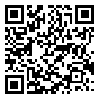BibTeX | RIS | EndNote | Medlars | ProCite | Reference Manager | RefWorks
Send citation to:
URL: http://rjms.iums.ac.ir/article-1-1458-en.html
Background & Aim: In epidemiologic studies, food frequency questionnaire (FFQ) is usually the most suitable dietary assessment tool on a long-term basis. Hence assessing its validity and reproducibility is conceptually important to determine the accurate relationship between diet and diseases. The current study was done to examine the relative validity and reproducibility of food groups of the semi-quantitative FFQ, developed for the Tehran Lipid and Glucose Study (TLGS).
Patients and Method: This study investigated 132 subjects (61 men and 71 women), aged ≥ 20 years who completed a 168-item FFQ twice (FFQ1-FFQ2), with a 14-month interval. Dietary data were collected monthly by means of twelve 24-hour dietary recalls. The
Results: Means (SD) for age and body mass index of subjects were 35.5 (±16.8) years and 25.5 (±5.2) kg/m2 respectively. In order to assess validity of the FFQ, age-adjusted and deattenuated Spearman correlation coefficients were performed. Coefficients ranged between 0.10 (solid fat) and 0.77 (refined sugar) in men (mean=0.44), and between 0.12 (snacks) and 0.79 (refined sugar) in women (mean= 0.42). Mean age-and energy-adjusted intraclass correlation coefficients, assessing reproducibility of the FFQ, were 0.51 in men, highest for tea (0.91), and 0.59 in women, highest for refined sugar (0.74). Mean percentages of disagreement were 7.3 in men and 9.3 in women, the highest percentage being observed for snacks and desserts in men and for tea and coffee in women.
Conclusion: The FFQ designed for TLGS was found to be reliable and valid for several food groups.
first DRwas collected one month after FFQ1 and the




